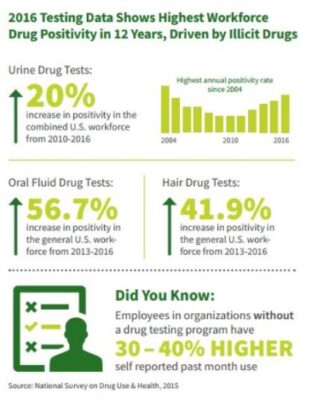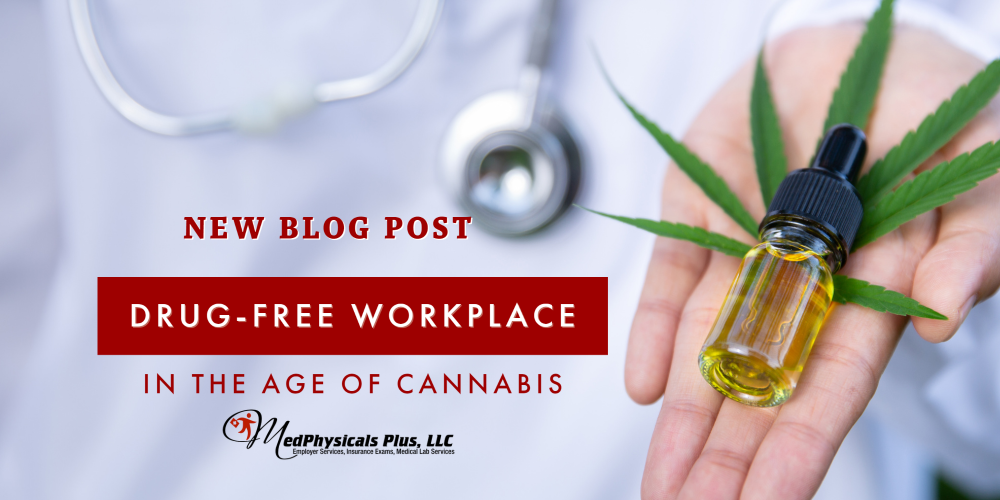4/20 What does ‘Drug-Free Workplace’ mean in the age of cannabis or weed?
“Marijuana legalization does not mean it is not a drug”
Marijuana is the most commonly detected drug among all of the workforce, including safety-sensitive. The U.S. general workforce positivity rate increased to 5.1 percent in 2018, according to the National Drug-Free Workplace Alliance (NDWA).
Drug-free Workplace in the Age of Cannabis
Previously, “Drug-Free Workplace” typically meant that any employees who were under the influence of or possessed any form of cannabis or other drugs were prohibited from being on the premises or performing any work. This includes any form of marijuana or any other illegal drug. A drug-free workplace also implied that any employees or contractors who were found to be in violation of this policy would be subject to disciplinary action, including termination.
Employers are allowed to test for marijuana, even in states where it is legal, if they have a specific drug testing policy that mandates a “drug free workplace.” However, in states where marijuana is legal, employers who do not have such a policy may want to consider testing for all other drugs instead of marijuana to avoid potential legal issues. It is important to note that drug testing policies should be clearly communicated to employees and applied consistently to avoid any potential discrimination claims. Additionally, employers should ensure that drug testing is conducted in accordance with applicable state and federal laws.
Additionally, the Substance Abuse and Mental Health Services Administration reported that in 2018, 83.9 percent of US employers had a drug-free workplace policy in place. According to the US Department of Labor, in 2018, approximately 83 percent of US workers were employed in workplaces where drug testing was either required or permitted. This number is up from 78 percent in 2017.
A “drug-free workplace” policy typically prohibits the use of illegal drugs, including marijuana, by employees on or off duty. This policy may also allow employers to conduct drug testing, including for marijuana, to ensure compliance with the policy and to maintain a safe and productive work environment.

Source: National Survey on Drug Use & Health
Marijuana Legalization Does Not Mean It is Not a Drug
Marijuana is legal in Alaska for both medical and recreational users, with some restrictions. It is legal to grow your own herb and possess up to one ounce (4 ounces in your private residence), but it is still illegal to sell or consume it in public.
In Alaska, marijuana is legal for recreational or medical use for adults ages 21 and over; however, its use is still illegal under federal law. Employers are generally allowed to set their own policies regarding drug use, including whether or not to drug test employees. As a result, an employer can choose to drug test their employees and make employment decisions based on the results, even if the employee has used marijuana in accordance with state law.
Therefore, if your employer drug tests and marijuana is detected in your system, they may take disciplinary action, including termination, even if you used the drug legally in your state. It is important to familiarize yourself with your employer’s drug policy and to be aware of the potential consequences of using marijuana, even if it is legal in your state.
Under the Alaska Medical Marijuana Act, employers are prohibited from taking employment actions against employees who use medical marijuana, as long as the employee’s use of marijuana is in compliance with the law.
MedPhysicals Plus’ primary goal is to help employers create a safe and drug-free workplace by screening out candidates who use drugs. MedPhysicals offers a range of drug-testing options, including urine, blood, and hair tests, and ensures that all tests are conducted in a fair and non-discriminatory manner. MedPhysicals’ services are particularly beneficial for employers in safety-sensitive industries such as transportation and healthcare, where impairment due to drugs could have safety risks.
References:
https://health.alaska.gov/dph/Director/Documents/marijuana/MarijuanaInTheWorkplace.pdf
https://www.paycor.com/resource-center/articles/pre-employment-drug-testing-laws-by-state/
https://www.thompsonhine.com/insights/in-the-weeds-marijuana-legalization-and-drug-testing-at-work/
Drug Testing – Law Office of Lori D. Ecker – Chicago, IL
https://pro.bloomberglaw.com/brief/cannabis-and-the-workplace/
Cannabis and the Workplace | Bloomberg Law
https://www.riskmanagementmonitor.com/drug-free-workplace-in-the-age-of-marijuana/
https://www.riskmanagementmonitor.com/workforce-drug-positivity-rate-highest-since-2004/
https://health.alaska.gov/dph/Director/Documents/marijuana/MarijuanaInTheWorkplace.pdf

